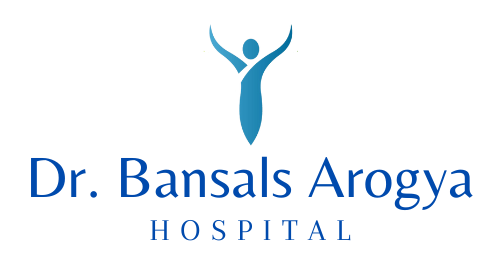Neurosurgery in Older adults
Medical Laboratory And Specialists Services
As we age, our bodies undergo various changes, including those within our brains. Neurosurgical conditions affecting the geriatric population require specialised care and attention. At Dr. Bansals Arogya Hospital, we understand the unique needs of older adults and offer comprehensive neurosurgical services tailored to their well-being.
Understanding Neurosurgical Conditions in the Elderly
1. Chronic Subdural Hematoma (CSDH):
What is CSDH?
CSDH is a condition characterised by the accumulation of blood between the brain’s surface (subdural space) and its outermost protective layer called the dura mater. This buildup of blood typically occurs slowly over time, often due to minor head injuries or spontaneous bleeding in the brain’s bridging veins. While it can affect individuals of any age, it is more common among older adults due to age-related brain atrophy and increased vulnerability of blood vessels.
Symptoms of CSDH:
The symptoms of CSDH can vary widely but may include:
● Headaches, which can range from mild to severe
● Cognitive impairment, such as confusion, memory problems, or difficulty concentrating
● Weakness, numbness, or changes in sensation
● Balance and coordination issues, leading to falls or unsteadiness
● Nausea, vomiting, and other neurological symptoms
Diagnosis and Treatment:
● Diagnosing CSDH typically involves a combination of imaging tests, such as CT scans or MRI scans, to visualise the hematoma and assess its size and location. Treatment options may vary based on the patient’s overall health, the size of the hematoma, and the severity of symptoms.
Common treatment approaches include:
● Observation: In some cases, small hematomas may resolve on their own without intervention, especially if they are not causing significant symptoms.
● Surgical Drainage: For larger or symptomatic hematomas, surgical intervention may be necessary. This can involve techniques such as burr hole surgery or craniotomy to drain the accumulated blood and relieve pressure on the brain.
● Middle Meningeal Artery Embolisation: In some cases of spontaneous or recurrent chronic subdural hematoma formation, the middle meningeal artery can be blocked so that the blood supply to the dural membrane is stopped and the haematoma growth arrests. This procedure only prevents recurrence and further expansion and is useful in patients who have severe comorbidities with multiple recurrences after burr hole surgery.
Prognosis:
● With prompt diagnosis and appropriate treatment, the prognosis for CSDH is generally favourable. Many patients experience significant improvement in symptoms following surgical drainage of the hematoma. However, close monitoring and follow-up care are essential to monitor for any potential complications or recurrence of the condition.
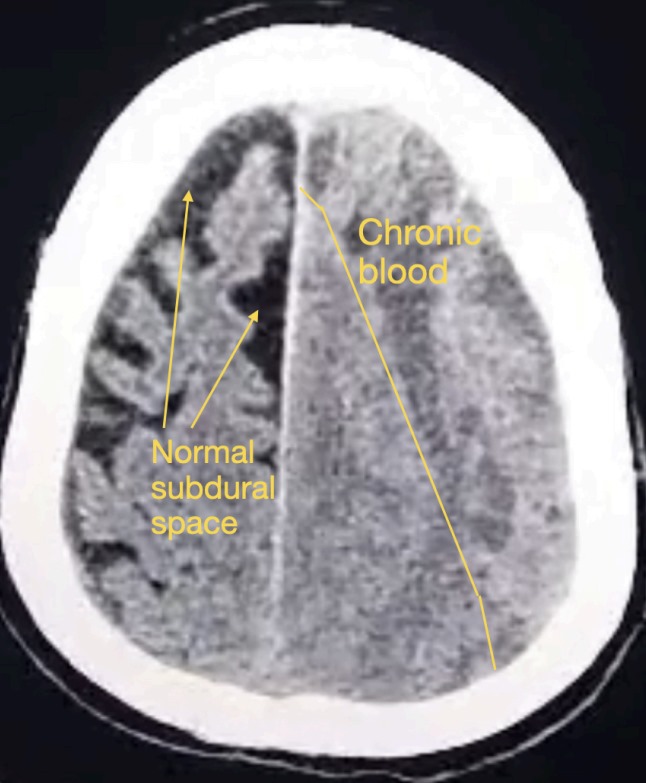
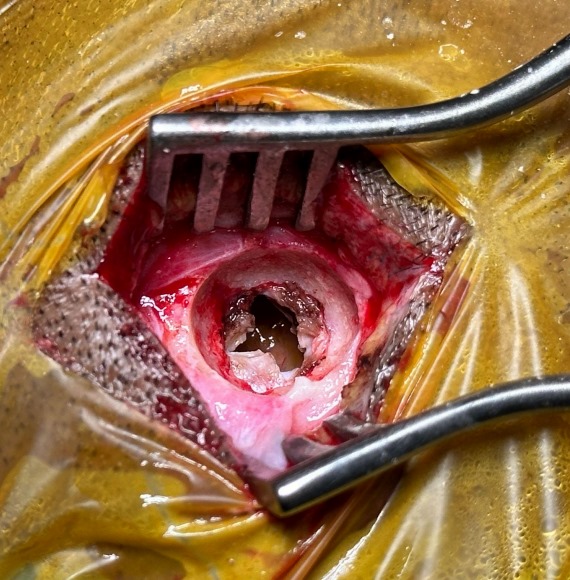
( Burr Hole with Brain Seen Inside )
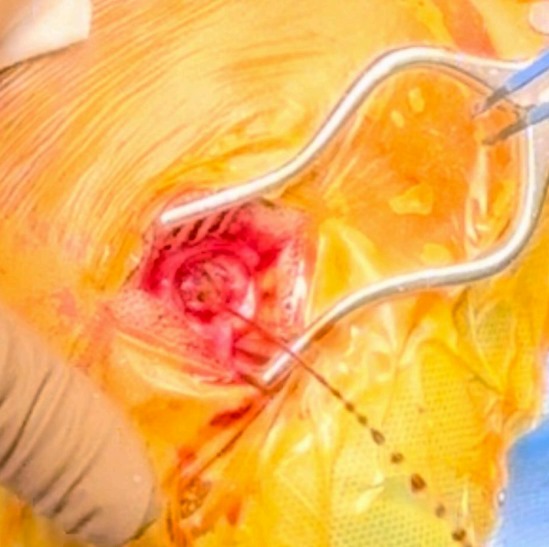
( Burr Hole with Altered Blood Gushing out of Dural Opening )
2. Normal Pressure Hydrocephalus (NPH):
Understanding NPH:
● NPH is a neurological disorder characterised by the abnormal accumulation of cerebrospinal fluid (CSF) within the brain’s ventricles, leading to increased volume of ventricles and accelerated degeneration with pressure effects on parts of the brain without increase in the net pressure inside the skull. Unlike other forms of hydrocephalus, the pressure in NPH remains within the normal range, hence the term “normal pressure.” The exact cause of NPH is not always clear, but it is believed to result from a disruption in the CSF circulation or absorption pathways within the brain.
Symptoms of NPH:
NPH is often referred to as a triad of symptoms, which typically include:
● Gait Disturbances: Patients may experience difficulty walking, shuffling steps, imbalance, or a tendency to fall.
● Urinary Incontinence: NPH can cause problems with bladder control, leading to urinary urgency, frequency, or leakage.
● Cognitive Decline: Patients may exhibit changes in cognitive function, such as memory problems, forgetfulness, confusion, or slowed thinking.
Diagnosis and Treatment:
● Diagnosing NPH involves a thorough neurological evaluation, including a review of symptoms, physical examination, and imaging studies such as MRI or CT scans to assess the ventricular size and CSF dynamics. Lumbar puncture (spinal tap) may also be performed to measure CSF pressure and evaluate for responsiveness to CSF drainage.
● When it occurs spontaneously without any previous bleeding, infection or tumour, it is known as Primary Normal Pressure Hydrocephalus. After previous bleeding, infection or tumour, it is known as Secondary normal pressure hydrocephalus.
● Treatment for NPH often involves surgical intervention, specifically the placement of a ventriculoperitoneal (VP) shunt. This shunt is a surgically implanted device that helps divert excess CSF from the brain’s ventricles to the abdominal cavity, where it can be absorbed naturally. Shunt placement can help alleviate symptoms and improve the patient’s quality of life. Alternatively some
cases can be treated using an endoscope to create a passage between the ventricles and the surrounding CSF space in a procedure known as Endoscopic
Third Ventriculostomy (ETV).
Prognosis:
● The prognosis for NPH can vary depending on factors such as the patient’s age, overall health, and the presence of other medical conditions. With timely diagnosis and appropriate treatment, many patients experience significant improvement in symptoms and functional abilities following shunt placement. However, ongoing monitoring and management are necessary to address any potential complications or adjustments needed for the shunt.
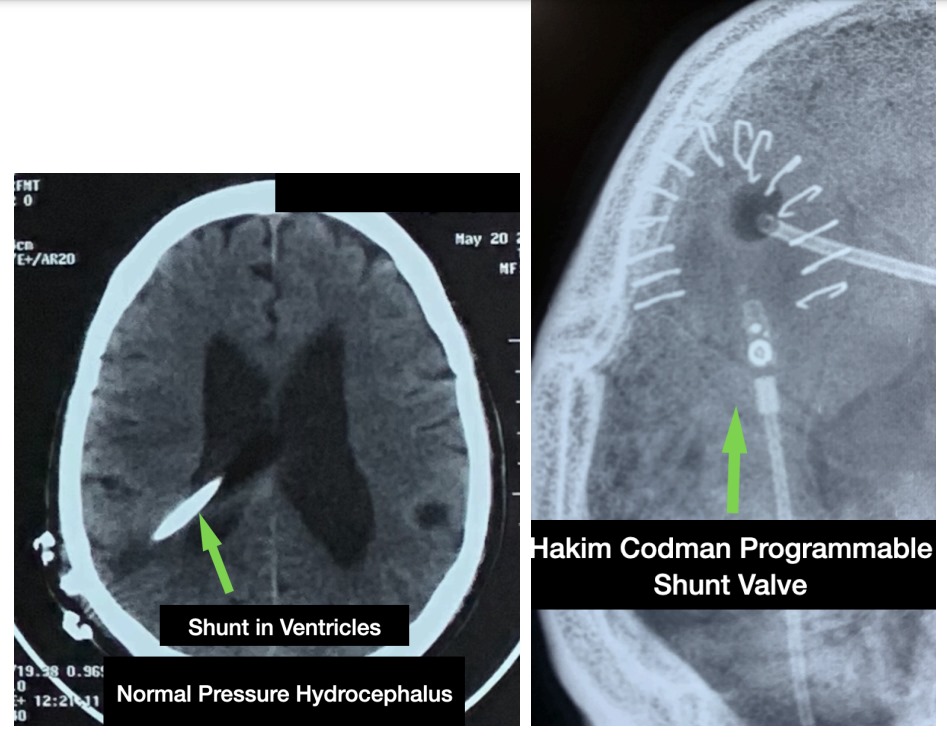
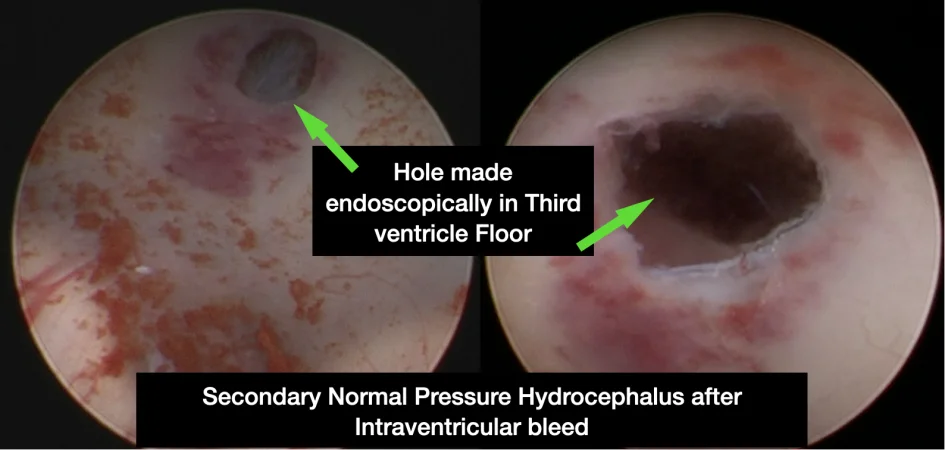
Why Choose Dr. Bansals Arogya Hospital?
- Expertise: Our neurosurgical team comprises experienced professionals specialising in
geriatric neurosurgery, ensuring the highest level of care. - Advanced Technology: We utilise cutting-edge diagnostic tools and surgical techniques
to accurately diagnose and treat neurosurgical conditions in older adults. - Compassionate Care: Patient well-being is our top priority, and we strive to provide
personalised, compassionate care throughout the treatment journey. - Postoperative Rehabilitation: Our comprehensive approach includes postoperative
rehabilitation programs to aid in the patient’s recovery and optimise outcomes.
Schedule a Consultation
If you or a loved one are experiencing symptoms of neurosurgical conditions such as CSDH or NPH, don’t hesitate to reach out. Schedule a consultation with our neurosurgical team at Dr. Bansals Arogya Hospital today. We’re here to provide expert care and support for a healthier tomorrow.
